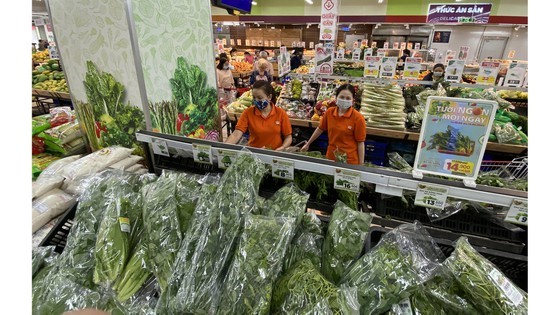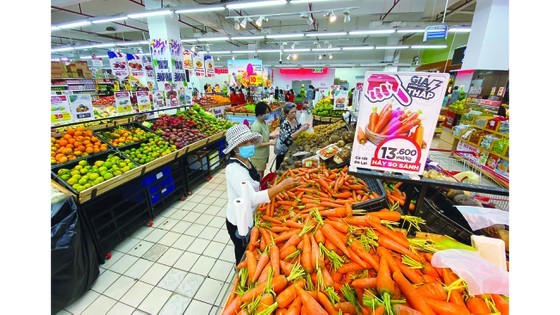
At Co.opmart Van Thanh, Vinmart Le Thanh Ton, and Big C An Phu supermarkets, shelves were fully packed with goods, from instant food, including instant noodles, pho, glass noodles, porridge, and seasonings, to rice, macaroni, pasta, cattle meat, poultry eggs and meat, processed foods, and even salt, the latest item that was said to be out of stock by netizens.
At Emart supermarket, according to Ms. T.M.Thuy, a resident in Phu Nhuan District, some consumers were collecting cheap instant noodles. Seasonings imported from South Korea and wet wipes with alcohol were also scarcer than usual and were waiting to import new batches.
Moreover, the supply of all kinds of fresh, and processed foods, including instant noodles with prices higher than VND4,000 per pack, was plentiful.
Mr. Le Trung Nha, Director of Co.opmart Van Thanh, said that supermarkets were flooded with goods but purchasing power has not been as high as expected.
‘From when the pandemic happened, rumor has it that goods are scarce, but purchasing power at supermarkets remains normal. At this moment, there is only a shortage of face masks and hand sanitizers due to a sudden increase in purchasing power as consumers reserve these items. I hope that in the next few days, manufacturers will increase production and provide sufficiently again,’ said Mr. Le Trung Nha.
Recently, the Domestic Markets Department under the Ministry of Industry and Trade made a field trip, inspected, and met some large distribution channels to study the situation of essential goods and price levels after the lunar New Year. At the meeting, leading distributors in Vietnam affirmed that the supply of goods was plentiful and diverse and there was no shortage of goods or hikes in the price.
Accordingly, enterprises have prepared well plans to store goods, at the same time, closely watched the supply capacity and purchasing power during the outbreak of the novel coronavirus to create general stability in the market.
Particularly, Big C has tripled the number of goods reserved at its warehouses; Co.opmart has increased 50 percent of goods; Vinmart has also raised goods supply by 30-50 percent.
At Emart supermarket, according to Ms. T.M.Thuy, a resident in Phu Nhuan District, some consumers were collecting cheap instant noodles. Seasonings imported from South Korea and wet wipes with alcohol were also scarcer than usual and were waiting to import new batches.
Moreover, the supply of all kinds of fresh, and processed foods, including instant noodles with prices higher than VND4,000 per pack, was plentiful.
Mr. Le Trung Nha, Director of Co.opmart Van Thanh, said that supermarkets were flooded with goods but purchasing power has not been as high as expected.
‘From when the pandemic happened, rumor has it that goods are scarce, but purchasing power at supermarkets remains normal. At this moment, there is only a shortage of face masks and hand sanitizers due to a sudden increase in purchasing power as consumers reserve these items. I hope that in the next few days, manufacturers will increase production and provide sufficiently again,’ said Mr. Le Trung Nha.
Recently, the Domestic Markets Department under the Ministry of Industry and Trade made a field trip, inspected, and met some large distribution channels to study the situation of essential goods and price levels after the lunar New Year. At the meeting, leading distributors in Vietnam affirmed that the supply of goods was plentiful and diverse and there was no shortage of goods or hikes in the price.
Accordingly, enterprises have prepared well plans to store goods, at the same time, closely watched the supply capacity and purchasing power during the outbreak of the novel coronavirus to create general stability in the market.
Particularly, Big C has tripled the number of goods reserved at its warehouses; Co.opmart has increased 50 percent of goods; Vinmart has also raised goods supply by 30-50 percent.
 Consumers buy vegetables at a supermarket in Ho Chi Minh City on Feb 10. (Photo: SGGP)
Consumers buy vegetables at a supermarket in Ho Chi Minh City on Feb 10. (Photo: SGGP)
Currently, essential goods that serve daily needs of people, including vegetables, fruits, rice, instant noodles, cattle meat, poultry meat and eggs, and seasonings, are provided and displayed with a large quantity by supermarkets. Their prices are listed clearly and are also stable compared to before the lunar New Year. Other distribution channels, including Mega Market, and Lotte Mart, have also actively collaborated with suppliers and farms to stabilize the supply and price.
Ms. Nguyen Huynh Trang, Deputy Director of the Department of Industry and Trade of Ho Chi Minh City, said that enterprises have been carrying out well the preparation and stockpiling of essential goods, following the city’s plan to cope with an acute respiratory infection caused by a new strain of the coronavirus.
Besides an increase of 30-40 percent in the production of essential food and foodstuffs prepared for the first quarter of this year compared to the implemented production in the same period last year, in case that the disease spreads widely in the community, enterprises will provide essential goods for consumers for free.
According to Ms. Nguyen Huynh Trang, in the short term, the city will continue to closely watch the situation, the supply and demand of essential goods, actively build and propose solutions to stabilize the market.
Accordingly, the Department of Industry and Trade has been cooperating with the Department of Information and Communications to provide accurate information on developments in the market and commodity prices, and timely handle false information that causes negative sentiment on consumers.
The city also encouraged city-based enterprises to promote production. In February this year, manufacturing enterprises will collaborate with distribution channels to offer discounts of 10-15 percent on essential food and foodstuff products.
In the long term, the city will meet provinces which supply a large number of goods for the city’s market, such as Dong Nai, Binh Duong, Lam Dong, Ben Tre, Dong Thap, and An Giang provinces, to capture the situation of cultivation, production, and supply activities; support enterprises to access loans with preferential interest rates to expand production and animal husbandry to create sources of goods; sign contracts to purchase high-quality products of cities and provinces, and increase connection, and building of close supply chains to ensure direct supply to consumers.
Ms. Nguyen Huynh Trang, Deputy Director of the Department of Industry and Trade of Ho Chi Minh City, said that enterprises have been carrying out well the preparation and stockpiling of essential goods, following the city’s plan to cope with an acute respiratory infection caused by a new strain of the coronavirus.
Besides an increase of 30-40 percent in the production of essential food and foodstuffs prepared for the first quarter of this year compared to the implemented production in the same period last year, in case that the disease spreads widely in the community, enterprises will provide essential goods for consumers for free.
According to Ms. Nguyen Huynh Trang, in the short term, the city will continue to closely watch the situation, the supply and demand of essential goods, actively build and propose solutions to stabilize the market.
Accordingly, the Department of Industry and Trade has been cooperating with the Department of Information and Communications to provide accurate information on developments in the market and commodity prices, and timely handle false information that causes negative sentiment on consumers.
The city also encouraged city-based enterprises to promote production. In February this year, manufacturing enterprises will collaborate with distribution channels to offer discounts of 10-15 percent on essential food and foodstuff products.
In the long term, the city will meet provinces which supply a large number of goods for the city’s market, such as Dong Nai, Binh Duong, Lam Dong, Ben Tre, Dong Thap, and An Giang provinces, to capture the situation of cultivation, production, and supply activities; support enterprises to access loans with preferential interest rates to expand production and animal husbandry to create sources of goods; sign contracts to purchase high-quality products of cities and provinces, and increase connection, and building of close supply chains to ensure direct supply to consumers.
























